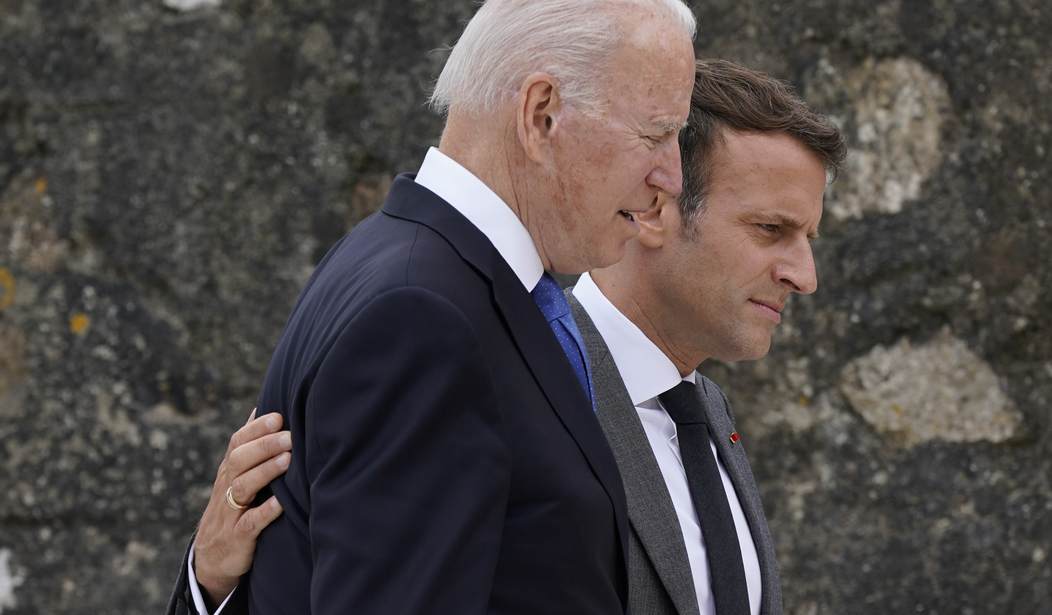Quel rôle, readers may ask? As it turns out, at least in the Indo-Pacific, France plays a significant role, and has significant resources to commit to it. Joe Biden will speak with Emmanuel Macron sometime today, Politico Europe reports, but Macron’s office insists that Biden be prepared to stop trying to encroach on French prerogatives as well as its submarine deals:
The White House first made a request for a call with Macron on Sunday in an effort to smooth over a growing diplomatic crisis over a new trilateral security partnership between the U.S., Australia and the U.K. — dubbed “AUKUS.”
France was blindsided by the announcement last Wednesday, having been kept in the dark about it by all involved. The partnership also claimed a multibillion-euro French submarine contract with Australia. On Friday, France called back its ambassadors to the U.S. and Australia in protest.
Macron expects Biden to “recognize that the discussions and consultations that should have taken place did not and that this raises questions of trust,” the official said.
Macron wants to launch a “solid process over time and at a high level to create the conditions to restore trust through actions and concrete measures, not just words,” the official added.
Isn’t it grand to see our alliances strengthened so well in the Biden era?
Macron and the French have more than one beef. They lost a ten-figure contract with Australia when two of their supposedly closest allies went behind France’s back to get Scott Morrison to renege on the French submarine contract. Even if Australia wanted a new deal, true allies would normally find a way to loop the previous contracted party into the new deal — at the very least, to avoid public diplomatic eruptions like this. Of course, true allies wouldn’t backdoor a friend either, which is part of why Macron’s so angry over this betrayal.
However, that’s really only part of the problem. The other part, as longtime Paris reporter John Lichfield explained at The UnHerd earlier this week, is that France sees itself as a primary guarantor of Western security in the Indo-Pacific theater. They may not have a robust navy, but they have strategic territory — and hoped that the partnership with Australia would serve to enhance their role:
There is an important part of this story which is often missing from British commentary. France is Australia’s neighbour. It is a Pacific nation — even a Pacific power. It is also an Indian Ocean nation.
Australia’s nearest neighbour to the east is New Caledonia, a French overseas territory, which is constitutionally part of France, not a French colony. Going west for a few thousand miles, Australia’s long-distance Indian Ocean neighbour is the island of Réunion, a French overseas département. The torpedoed submarine deal was the cornerstone of a new Pacific and Indian Ocean security partnership between France and Australia — re-asserted this year when Prime Minister Morrisson visited President Emmanuel Macron in the Elysée Palace. That deal is now also, in effect, dead.
The French had hopes of playing an allied but independent-minded role in the Indo-Pacific region, alongside Australia, the United States and Japan. Macron especially wanted to strengthen France’s role there because he feared that Washington — whichever President might be in power — would stumble into a confrontational approach to China. He wanted Europe to have its own calming voice in western-Chinese relations.
Some commentators in France are suggesting that AUKUS is just a vulgar arms deal dressed up as a security pact. Washington, they say, was under pressure from the US military-industrial lobby to steal the French deal when evidence emerged that it was struggling (as all such big deals do). Senior French sources say that, au contraire, the principal attraction for Washington was to destroy the Franco-Oz pact and putting the French in their place. European and other countries are officially encouraged by the US to join in the policing of the Pacific or the South China Sea – but as junior partners not as thinking heads.
In other words, France may be unhappy about losing a $60 billion contract, but the real betrayal is in the way Biden and Boris Johnson just excluded France from its legitimate sphere of influence in the Indo-Pacific. Who knows what France would have done with an “allied but independent role” in the region regarding China, but Biden and Johnson apparently didn’t trust France enough to wait and see.
That is a massive insult, and it explains why France pulled its ambassadors over it. That may still have been an overreaction, but given this context, it’s a lot more understandable than just a tiff over a lost defense contract.
So why did Biden and Johnson cut France off at the knees like this? Johnson may have had some scores to settle over the EU-Brexit negotiations, where France has pushed some of the harder-line positions on trade controls. Biden, however, has no rational reason to stab France in the back like this — especially when Biden opposed Brexit and has warned Johnson about complying with the Good Friday Agreement regarding the borderless frontier in Ireland.
It’s utterly incoherent, all the more so considering Biden’s promises to “restore” our alliances. Bang-up job so far, Joe.








Join the conversation as a VIP Member